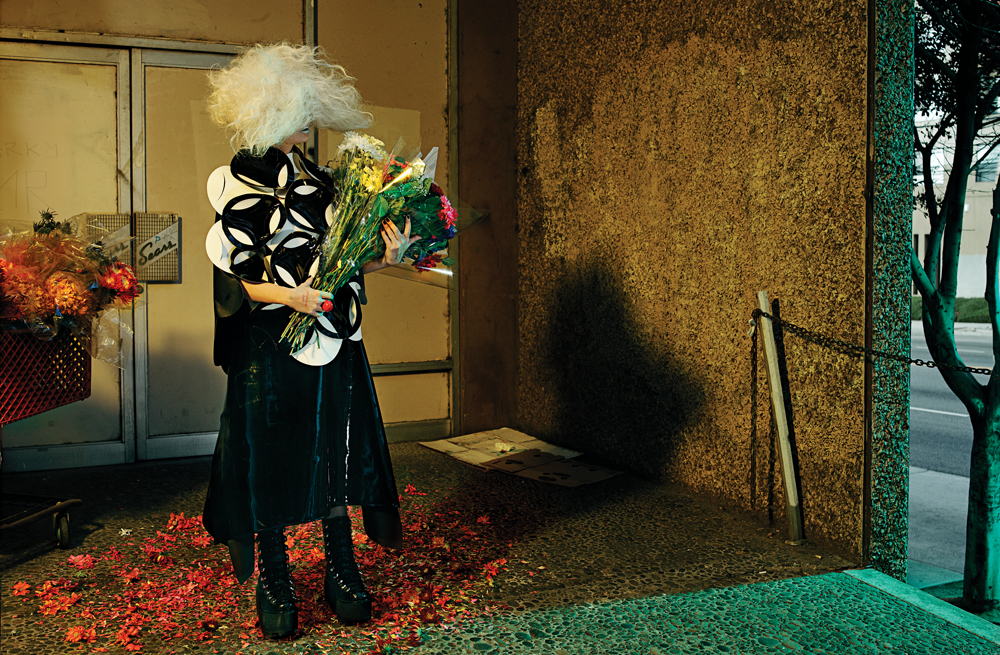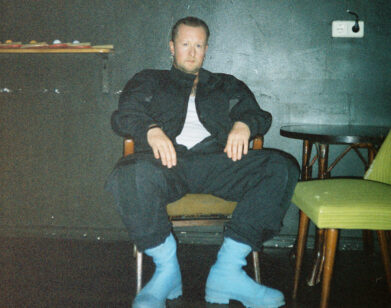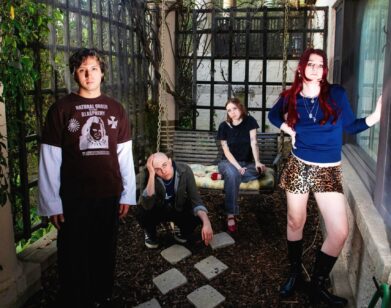Sia
I would like to be able to make great pop music for another 20 years. And it feels like creating a sort of inanimate blond bob and allowing other people to play the role of the pop singer, it affords me a little bit more freedom in terms of my expiration date. SIA
What would happen if a pop star were to hold back from public view all but a few of her identifying characteristics? Without a famous face, well-documented dating history, and popular backstory, how then are we to know her? What is left for us to focus on, critique, adore, pin up, or tear down?
In the case of the self-protective 39-year-old Australian singer-songwriter Sia, who hasn’t shown her face in a magazine or during a live performance since 2013, what remains in the public consciousness is a kind of trademark severe sunshine-blond bob wig—and a sensational voice. For almost two decades, Sia (born Sia Furler) has had success (and performed in public) in her native Down Under, as well as in the U.S. and Europe—recording with the band Zero 7 and, from 1997, as a solo artist. This recent move toward privacy preceded the enormous, and perhaps not entirely unrelated, smash hit of her 2014 album 1000 Forms of Fear. Continuing her past work of laying emotional vocals over electro-pop beats, Fear is loaded with Sia’s signature catchy, dancey anthems and animated by her deep, playful, and powerful mezzo-soprano. Working with actors, including Kristen Wiig, who performed “Chandelier” as a Sia-esque character in said wig at the Grammys this past February, as well as Shia LaBeouf and the young dancer Maddie Ziegler, who starred in the music videos for both “Elastic Heart” and “Chandelier,” Sia has created a visual accompaniment for her music on stage and screen that confronts our utter devotion to the avatar-industrial complex. Is it a gimmick? “For sure,” she says, but it is also an attempt to retain some sense of normalcy in her life. Along with this new burst of popularity have come the offers, and Sia has recently collaborated with Kanye West (on “Wolves”) and contributed a song to the Fifty Shades of Grey soundtrack.
For Sia, who writes frequently for the Beyoncés and Rihannas of the world but doesn’t want any of the trappings of those stars’ lifestyles, the gimmick is also a game, an art project, and a form of self-preservation. As she tells her pal Wiig, none of the recent success, nor, indeed, the distillation of her image down to that singular hairstyle, was uncalculated. But the control she is able to exert over her professional life is a necessary luxury, a way to make art globally and stay sane locally.
SIA: Let’s talk about our insomnia first. What the fuck is happening?
KRISTEN WIIG: I’m not sleeping very well. But this is not about me.
SIA: It’s about us.
WIIG: I’m fine now. I’m not as delirious as I was this morning.
SIA: I couldn’t sleep till 5 a.m. It was just last night, though. It doesn’t happen to me every night.
WIIG: How did we meet?
SIA: I think we met at [Strokes guitarist] Nick Valensi’s birthday party.
WIIG: Oh my gosh, at that dinner?
SIA: I think it was a bar. And I was pretty newly sober. So I remember being in a bar was kind of like, “Whoa.” And then maybe four months later, I bumped into you. You were with [actress] Ari Graynor. And then I got a text message from Fab [Fabrizio Moretti, also of the Strokes] …
WIIG: I remember I said to him, “Please tell her that her album has helped me so much.” I really said that. I just thought [1000 Forms of Fear] was such a beautiful, open, amazing record. I was listening to it nonstop. And then I kind of made a joke to have Fab tell you, “If she ever wants me to, like, dance in the background of one of her videos, I’m available.” Then you and I were texting.
SIA: So I pounced on it.
WIIG: So did I. I didn’t quite think about what I was saying yes to until after I hit send.
SIA: I was like, “Great, the Grammys are coming up. Do you want to do it?” First, it was just, “Well, would you want to just do dancing? Or would you want to accept an award if I were to win?” And you were like, “Dancing all the way.” So I wanted to find a big enough and cool enough thing for you to do.
WIIG: That was seriously one of the best nights of my life, creatively and everything. It was so fun to be there with you and to experience that. I love you.
SIA: I love you. Also on one of the greatest days of your life, you danced with Madonna [at her post-Grammys party] …
WIIG: Oh, yeah. That was fun. That’s not a regular thing.
SIA: I recently invited you to come see Olivia Newton-John with me in Las Vegas. And you responded by sending me a photo of you with Olivia Newton-John in London.
WIIG: Well, I have been very open about my obsession with Olivia Newton-John. In fact, her people invited me. And I was like, “Oh my gosh.” So I took my best friend and it was amazing.
SIA: It’s like a dream. Some people asked me if I would do an Australian-centric concert. And I don’t love performing, because it’s nerve-racking and it’s time-consuming to rehearse a whole set—and my time can often be better served writing music and just making it and putting it out. So I was like, “Hmm, it’s bad strategy. So probably a no.” And then I thought, “Wait a second. I can make this really fun for myself. If they can get Olivia Newton-John to sing with me at the event, I would do it in a heartbeat.” It was all me trying to manipulate my childhood dreams into reality. Anyway, she was unavailable, and I passed on the event, but three months later I got an e-mail from Olivia Newton-John. I can’t tell you, it was, like, I don’t know, jumping out of an airplane or something. She was writing to me, the little girl who sat on my sofa and watched Grease [1978], like, 163 times? I got chills. They’re multiplying.
WIIG: Your Ellen performances were so elaborate and beautiful. [Sia directed Maddie Ziegler in performances of “Chandelier” and “Elastic Heart.”] You put so much time into these things, and it’s so appreciated by people who get to watch it. Is that part of the reason why it’s a bit of a thing for you to put on a performance, because you want it to be a special, separate thing? Or is it just nerves or what?
SIA: There are a couple of different facets. I’m happy to do the odd TV bit because I really enjoy directing the live performances. All of the work that goes into it is enjoyable because I’m passionate about it. And it’s just one song, so there’s not a lot of the laborious stuff, like rehearsing or learning the lyrics. For me, writing and recording the songs are fine, but then promoting it is usually, like … I think Tom Waits called it “doing the dishes”-promo, talking about yourself all the time, answering the same questions for, like, a trillion magazines or TV shows or radio shows. And it sort of makes you feel crazy. It literally fucks with my sanity. I stop feeling authentic because I’m trying to find ways to say the same thing differently. And after a while, you can’t. It becomes bad for my self-esteem. And touring is hard just because you have to learn a lot of songs, a lot of lyrics. You have to hire a lot of people to play the songs. And because I do like to put on a show, I then have to hire a lot of people to create some kind of event around it, performance-wise. I’m paying 19 people—I was directing maybe 19 people for our Grammy performance—and for a live performance on tour, you’re directing them for ten songs. So that just adds exponentially more work. And on top of that, you have to travel. And I don’t like to stay away from my dogs or be out in the world.
WIIG: It’s hard.
SIA: I toured for 13 years, and it was very lonely, and it was hard work. I’m not afraid of hard work, especially if it’s for stuff that I enjoy. But I actually don’t think you could name one artist who enjoys promo or touring after the first three to six months of an album cycle.
WIIG: Well, you’re so good at it. The Grammy thing, you directed every little thing: costumes, set, camera, everything. It was amazing to watch.
SIA: Thank you for saying that. I’m starting to cry because I’m still having that insecurity where I wonder if I’m a real director or not. I’m like, “Am I? Or is this still a vanity project? Am I just a singer who’s attaching her name to something? Or am I really directing?” I do need people to help me feel comfortable in that area. I can’t do it without Daniel Askill, my co-director on the music videos, and [choreographer] Ryan [Heffington] to create these beautiful physical landscapes, and Maddie, and you with your gifts, and Shia, with his real gift of imparting feelings. It feels like a truly collaborative experience. It’s such a privilege, because I still feel like an interloper.
WIIG: In any of the creative arts, you rarely meet people who are like, “Hey, I’m great.” We all have our insecurities and we all kind of don’t know if we belong here: “I’m not sure if I’m supposed to be doing this, and all the other people who do this know that I’m really not supposed to be here.” It’s so subjective. What’s good, what’s bad? A song can be good to one person and bad to another. An acting performance can be loved or hated. It’s hard to have a very strong foot on the ground and feel confident in that world.
SIA: Certainly with singing or songwriting, I feel quite confident that I’m skilled at my craft, that I’ve honed the skills I was given. So I could probably use humbling in that department. But when it comes to the visual side of things, which I’m dipping my toe in, I’m definitely appreciative for any fucking glimmer of validation that I’m actually doing it and that I’m doing it right.
WIIG: Can you talk about you possibly directing something that you’re writing?
SIA: Yeah, I’m excited about that. I’m on page 65 now of the screenplay. I wrote a short story eight years ago. It’s called Sister, and I’m going to direct it. I just want to make a beautiful film. I’ve had it in my head for so long, so I want to try. Every now and again I get scared. And that’s not really how I operate in songwriting or as Sia the artist, the singer. I don’t operate from a place of fear. But this is such a new area for me. I still have some insecurity. So, like, once a week I get washed from the top of my skull down to my toes with this vomitous feeling of fear. I think, “Just don’t do it. You don’t have to do it. You’re already a singer and a songwriter. You don’t have to be a director. Really, you don’t have to make a movie.”
WIIG: It’s easy to be comfortable, but you know in your brain that you have to.
SIA: Right, I have to do it. I’m so scared it’ll be bad. I wouldn’t even talk about it for the first three years, because I was so sure people would just think it was some dumb singer’s vanity project.
WIIG: It’s so hard to say this, because I have that exact same fear, but don’t think about the final outcome. It really is just a process of doing it, which is why we do this crazy thing called performing. Before I do something, I’m always like, “Why am I even presenting at the Golden Globes? I’m so nervous. Why aren’t I just home watching this? Why do I do this to myself?”
SIA: That sounds so terrifying and horrible, by the way. Was that when you wore that beautiful white dress that was frilly around the shoulder? You looked great. But that is so nerve-racking, I can’t even … Yeah, ugh.
WIIG: But you know you have to do it. And when you’re done doing it, it’s such a great feeling.
SIA: If you’re anything like me, you get a feeling in your stomach that propels you forward into new and dangerous territories. Sometimes I feel compelled to say yes to things and I’m not sure why. And I’d say 95 percent of the time, those intuitive yeses have turned out to be really helpful for me, you know, in my [sarcastic accent] “spiritual growth,” but also creatively and professionally. I hope we can put stupid accent in brackets next to where we say silly things.
WIIG: I bet we could. Obviously, everyone knows you write a lot of songs for people other than yourself. Do you write those songs for yourself, and then they don’t feel like you, and so you offer it to someone else? Or are people coming to you? How does it work?
SIA: I’ll just go into a session to write a song. Someone will play me tracks and I’ll sing over the tracks the first time I’m hearing it. I record myself singing. And so if I’m with a new producer, they might play me three to ten tracks and I’m singing over them each time, fully formed pop tracks. I don’t do sessions for myself ever. I’m always working, writing for pop sessions. And what happens is that sometimes I like a song so much I keep it for myself.
WIIG: So a lot of the songs on your album, those were tracks that were already produced?
SIA: Some of them. On my old albums, I always started writing the song from scratch with whoever I was collaborating with. Now people will send me tracks. Or I’ll go into a session and play new tracks. And I choose the track that I think, “When I have married it with my melody, it’s going to be a hit.” That’s a curatorial process more so than anything else. And then I’ll write the song based on the feeling it gave me, like, it felt like a hit.
WIIG: Oh, that’s so cool.
SIA: Sometimes after I finish the lyrics and have all the melodies and harmonies and the pop and vocal, I’ll be like, “I have to keep it. I love it too much.” There are only a couple of people I work with—Greg Kurstin and Chris Braide—who I write songs with from scratch. Greg produced my album. In fact, for this album, there were a couple of days where I did go in specifically to write for myself. I knew I wanted to do something that was a step just left of traditional for what’s played on the radio. The first songs we wrote were “Fair Game” and “Cellophane.” And then I kept writing pop songs for other people, but it suddenly felt like I wanted them for my own album. Because I had no plans to make another album—until I realized I needed to put an album out to get out of my current publishing deal. I hadn’t had any plans to be an artist anymore. But then I was like, “Well, it will get me out of my publishing deal. It’ll be good to make another record.”
WIIG: How crazy.
SIA: My original plan was to give it away, but it had to come out on a major label, and they’re not going to want to give it away for free. I had no plans to promote it or tour it. I was newly sober and I didn’t want to be a famous singer. So I delivered it to the label in the U.K. They put out the song “Chandelier,” and then I felt, for fun, I would direct this video for it. I really felt like “Chandelier” was a big pop song. But we weren’t sure what would happen if I wasn’t willing to show my face and do promo and go on tour and do the traditional kind of pop strategy. So I had no expectations. Because of that, I was able to take a great risk, which is the risk of failure as a solo artist, because I was already gratefully making good money writing pop songs for pop stars.
WIIG: Wow.
SIA: I had the idea that, well, if Amy Winehouse had been the bouffant, maybe I was the blond bob. I wasn’t saturating the market; I was an indie-pop singer. And not that many people knew who I was anyway. I thought, “Well, I have one thing—I used to have a blond bob, and maybe I’ll make myself just a blond bob.”
WIIG: What did the record label think of that?
SIA: It was scary to them. It’s a testament to my management that they took the idea to them and said, “You’ve got to trust her.” A lot of people wanted to do record deals with me. And RCA was the only one that was really willing to come to my party in the way that I wanted to work in the future. I had in my contract: no promo, no touring, no appearances in any music videos. I didn’t ask for a lot of money. I think I got an advance of $50,000. So it wasn’t a great risk to them either, you know. I just did little bits of press—Ellen, Howard Stern. I think this is only the fourth interview I’ve done. I love that the work that has gone into it has been behind the scenes. People say, “Enough of this shit where she doesn’t show her face,” and “It’s a gimmick.” For sure. I’m trying to do this differently, for serenity. And it’s a fun game for me as well. I have nothing to lose. But of course I want to be loved. So when people say, “Show your face, you’re not ugly.” I want to say, “I know. I’m not doing it because I think I’m ugly; I’m trying to have some control over my image. And I’m allowed to maintain some modicum of privacy. But also I would like not to be picked apart or for people to observe when I put on ten pounds or take off ten pounds or I have a hair extension out of place or my fake tan is botched.” Most people don’t have to be under that pressure, and I’d like to be one of them. I don’t want to be followed by paparazzi. I don’t go on Twitter. Because when people say things like, I don’t know, “I hope you get cancer and die,” it hurts my feelings.
WIIG: It does.
SIA: I’m just trying to work out a way to be a singer and to create cool content. I’m willing to do that as an entertainer. But I’m not willing to give up my actual self. And the way the system is built up, there’ll be a backlash soon. Just recently some people published 11 photos of Sia’s face. It’s a bummer for me because it’s going to elevate my profile and make me more recognizable. But I don’t look the same as I did when I used to have my photo taken. So I’m just trying to be one step removed. Music is for your ears, not your eyes, right? But film is for your eyes, and I would like to give you something. I want you to be entertained. I want you to get the full package. I’d just rather it not center around whether or not I have cellulite.
WIIG: Right.
SIA: I’m 39, and I would like to be able to make great pop music for another 20 years. And it feels like creating a sort of inanimate blond bob and allowing other people to play the role of the pop singer, it affords me a little bit more freedom in terms of my expiration date.
WIIG: I think people can definitely relate to that. I know I can. I’m wearing a mask right now and I’m just walking around downtown New York. Nobody can see me! [both laugh] Everyone knows who you are. Everyone knows your music. But it’s so great that you can weave in and out of life and still have all of the good stuff and none of the bad stuff.
SIA: I’ll just have to keep trying to do it. Because my ego could definitely get in the way. You know, I made a mistake. I went to parties on Oscar night and I didn’t hide my face. And then I realized that it’s work. What was I thinking? I could have dinner with these people at their houses, but anywhere you go now where there’s a camera, it’s actually work. I was excited because I got invited to these big, fancy parties. And then you realize, “If I’m going to go, I’m going to need to get a tan. I’m going to need to have my roots done. I’m going to have extensions, probably. I’m going to get a stylist for sure. I’m going to have to work out five times that week with Jennifer Aniston’s trainer.” This is commerce and I’m $5,000 in the hole just to go to a party. So it was a great learning experience. That is not what I’m going to be doing in the future. But it’s funny to hear people in the biz say, “Oh, it’s nice you showed your pretty face.” You, of all people, should know. You can’t even leave the house. I need to go to a meeting, a 12-step meeting, and then, like, hang out with a bunch of really fucking major weirdoes. That’s what I need.
WIIG: Do you believe in aliens or mermaids or something?
SIA: I do. I think that it would be unwise of us not to believe that there is life outside of us, intelligent life. And so I do believe in aliens. I have seen the [former] Canadian minister of defense discuss the fact that he knows that the American government is working with five different species of aliens presently. Which is a real fucking mind-blower. I want to believe in a way that makes me feel a little bit scared. So then I like to think about dogs because it makes me feel safe. And mermaids. I believe in Daryl Hannah.
KRISTEN WIIG IS AN OSCAR-NOMINATED WRITER, ACTRESS, COMEDIAN, AND FORMER CAST MEMBER OF SATURDAY NIGHT LIVE. UPCOMING, SHE CAN BE SEEN IN THE FILMS WELCOME TO ME, THE DIARY OF A TEENAGE GIRL, AND NASTY BABY.







